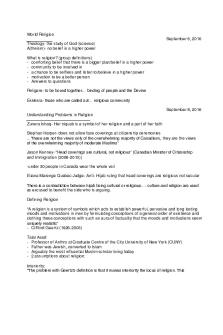Chapter 9 - Summary The Worlds Religions: Our Great Wisdom Traditions PDF

| Title | Chapter 9 - Summary The Worlds Religions: Our Great Wisdom Traditions |
|---|---|
| Author | Poojan Parikh |
| Course | Religions Of The World |
| Institution | Saint Louis University |
| Pages | 2 |
| File Size | 75.8 KB |
| File Type | |
| Total Downloads | 87 |
| Total Views | 180 |
Summary
A mandatory assignment unavailable on Shmoop, this is a summary of Chapter 9 from "The Worlds Religions: Our Great Wisdom Traditions" by Huston Smith...
Description
Dr. Oughton, World Religions Chapter 9 Summary The Primal Religions
Primal religions existed before the major religions today o Alternatively called tribal because its groupings were invariably small o Oral because writing was unknown to them o Mode of religiosity continues in Africa, Australia, Southeast Asia, the Pacific Islands, Siberia, and among the Indians of North and South America o Numbers are diminishing
The Australian Experience
Australia is the only continent that did not undergo the Neolithic experience
The world that the aborigines ordinarily experience is measured out by time o Seasons cycle and generations come and go
Aboriginal religion does not focus on worship o Focuses on identification
The entire aboriginal religion is ritual
Orality, Place, and Time
Literacy is unknown to primal religions
Writing does not leave the virtues of orality intact o In important ways, writing undercuts these virtues
“Each member of the tribe becomes its walking library”
A disadvantage of writing is its ability to proliferate to the point that people get lost in its “endless corridors”
o Secondary material blurs what is important
“Place is not space”
In contrast to the historical religions of the West, primal religions give the appearance of looking toward the past o Primal time is neither linear nor cyclic o Primal time is “atemporal”
The Primal World
“The web of tribal relationships sustains them psychologically and energizes every aspect of their life”
Tribe is embedded in nature
Through principle of totemism, primal people disregard altogether the division between animals and humans o Animals and birds are frequently referred to as “peoples”
The Symbolic Mind
Symbolist mentality is the most important single feature of living primal spirituality o Symbolist vision sees the things of the world as transparent to their divine source
Conclusion
Time appears to be on the side of historical religions
“[Primal peoples] are not backward; they are different. They are not impaired; they are apart”
“Every people, ourselves not excepted, needs to think well of its origins”...
Similar Free PDFs

Summary the Great gatsby
- 3 Pages

Chapter 1 - Summary Our Sexuality
- 15 Pages

Exploring World Religions Summary
- 19 Pages

The Wisdom of Crowds
- 17 Pages

The Great Gatsby- Chapter Six
- 1 Pages

Chapter 11 - The Great Plains
- 8 Pages

GEO174 Chapter Summary 9
- 3 Pages
Popular Institutions
- Tinajero National High School - Annex
- Politeknik Caltex Riau
- Yokohama City University
- SGT University
- University of Al-Qadisiyah
- Divine Word College of Vigan
- Techniek College Rotterdam
- Universidade de Santiago
- Universiti Teknologi MARA Cawangan Johor Kampus Pasir Gudang
- Poltekkes Kemenkes Yogyakarta
- Baguio City National High School
- Colegio san marcos
- preparatoria uno
- Centro de Bachillerato Tecnológico Industrial y de Servicios No. 107
- Dalian Maritime University
- Quang Trung Secondary School
- Colegio Tecnológico en Informática
- Corporación Regional de Educación Superior
- Grupo CEDVA
- Dar Al Uloom University
- Centro de Estudios Preuniversitarios de la Universidad Nacional de Ingeniería
- 上智大学
- Aakash International School, Nuna Majara
- San Felipe Neri Catholic School
- Kang Chiao International School - New Taipei City
- Misamis Occidental National High School
- Institución Educativa Escuela Normal Juan Ladrilleros
- Kolehiyo ng Pantukan
- Batanes State College
- Instituto Continental
- Sekolah Menengah Kejuruan Kesehatan Kaltara (Tarakan)
- Colegio de La Inmaculada Concepcion - Cebu








